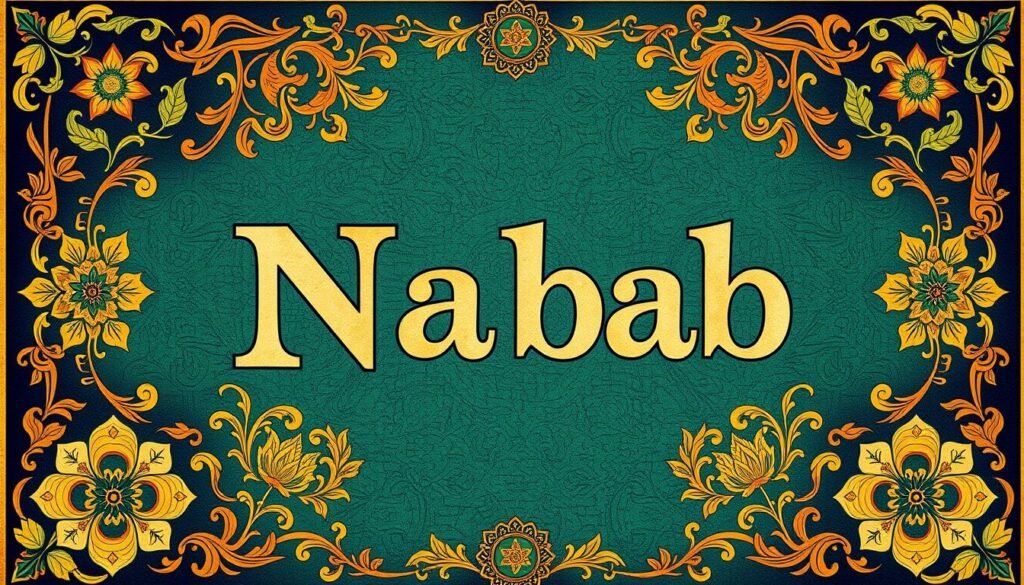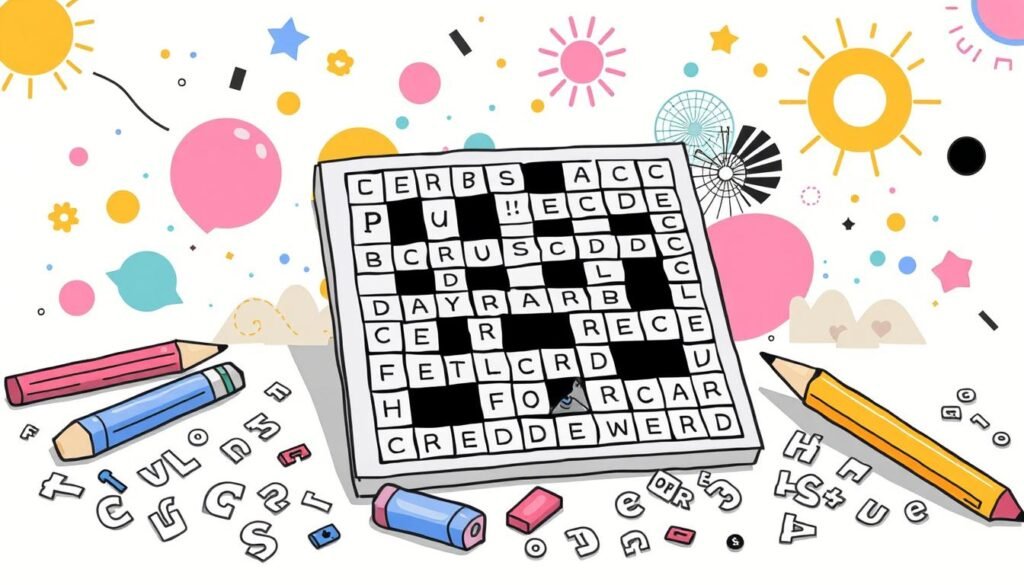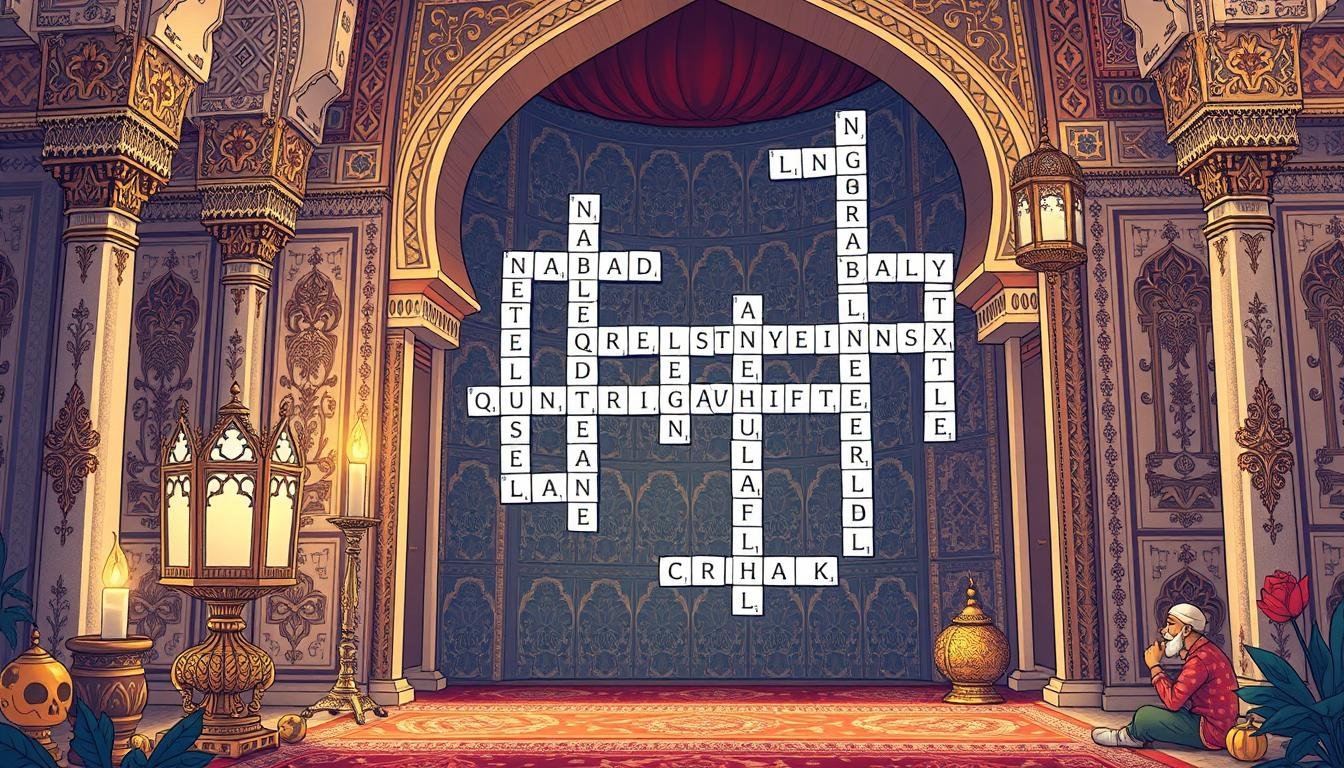Ever wondered about the word “nabob” and its deep meaning? It’s a key part of crossword puzzles. “Nabob” comes from the Muslim honorific “nawab.” This shows how words change and their importance in culture.
Let’s dive into the story of “nabob.” We’ll see how it connects to puzzles and its cultural value.
Understanding the Term “Nabob”
The term “Nabob” is very interesting in the world of languages, especially with Islamic titles. It means people with a lot of money and power. It comes from the Arabic word “nawab,” which was a title for leaders under Mughal emperors in the Indian subcontinent.
Looking into the cultural meaning of nabobs shows a mix of power and roles in society. They had a lot of authority and helped shape the world around them. This makes us think about how money and power work today, even in puzzles where culture is important.
What Is a Muslim Honorific?
Muslim honorifics are key terms in Islamic culture. They show respect, authority, and social status. Names like “Emir,” “Sultan,” “Nawab,” “Amir,” and “Sidi” highlight the diversity of Muslim societies.
These terms have deep historical and cultural meanings. For example, “Amir” and “Sidi” were seen in crossword puzzles a lot. This shows how often they are used in Islamic discussions.
These honorifics deeply impact our language and culture. They make our communication richer and more meaningful in communities. The title “Nawab,” for instance, is linked to “nabob” and appeared in many clues.
Other titles like “Aga” from Turkey and “Hafiz” and “Sayid” are very common. They show the richness of Islamic culture and the role of language in it. Each title has its own story and importance.
Muslim Honorific From Which Nabob Is Derived Crossword?
The use of Islamic titles in today’s language shows a deep history. This is seen in the Nabob crossword clue. It leads players to learn about “nawab,” its origins, and its meaning.
When we see “nawab,” it’s a sign of high status in Islamic societies. It shows respect and power. This sparks interest in its use over time and in different places.
By solving the Nabob crossword clue, we travel through history. We learn about the meanings of Islamic titles. This makes solving crosswords more interesting and helps us understand culture better.

Common Crossword Clues Related to “Nabob”
Crossword puzzles often have crossword clues that explore culture and history. The term “nabob” is often used, meaning someone with a lot of wealth and status. Clues like “Moslem prince,” “V.I.P.,” and “Mogul governor” show the link between power, money, and Islamic history.
When we solve these clues, we learn about the Mughal Empire’s impact on language. It shows how words evolve in complex societies. Solving crosswords not only makes us smarter but also helps us understand cultural and historical terms better.
The Historical Context of the Term “Nawab”
The term “nawab” has a rich history and cultural importance. It comes from the Mughal Empire’s language and governance. The word “nawab” means deputy in Arabic, showing its Arabic roots.
This word changed to Persian and Urdu, used in the Indian subcontinent. It shows how words travel and change over time.
Origin and Etymology of “Nawab”
The word “nawab” shows how language and power mix. It started in the Mughal Empire, where it was a key title. Nawabs were governors, ruling over different areas.
They had a lot of power and freedom, a unique part of Islamic rule. This shows how language and power work together in history.
Usage in Historical Context
The term “nawab” was more than a title. It was a big part of society and politics in a key time. Nawabs kept order, collected taxes, and supported local cultures.
Looking at this history helps us understand the term’s importance. It shows how the Mughal Empire’s rule still affects us today. It helps us see how old ideas of power and leadership still shape our views.
Crossword Puzzle Strategies for Solving Clues
Cracking crossword puzzles requires smart strategies. These strategies boost your language skills and thinking. Look for word patterns and common prefixes or suffixes. They can lead you to the right answers.
For example, the NYT crossword often features well-known phrases. Entries like “FORTUNE COOKIE” and “CATCH RED-HANDED” show up. They hint at the answers you need to find.
Working on puzzles improves your language skills and connects you with others. Sharing tips on tricky clues helps everyone. It makes solving puzzles more fun and helps you think better.
Looking at the themes in clues is key. They might be about culture or abstract ideas. This makes solving puzzles both fun and educational.

Impact of Islamic Titles in the Subcontinent
The influence of Islamic titles in the subcontinent is deep and complex. Titles like “nawab” have a big cultural impact. They show the details of social roles over time.
These titles show hierarchy and the values of the communities that used them. They are seen in literature, art, and politics. Looking at their history helps us understand power, cultural exchange, and identity changes.
Related Crossword Terms to “Nabob”
Looking into the connections of “Nabob” with other terms helps us understand Islamic titles better. It shows how “emir” and “sultan” are linked to “Nabob.” These titles mean nobility but change based on where they are used in the Islamic world. Knowing this helps us solve puzzles and learn more about Islamic history.
Connections to Other Islamic Titles
“Emir” and “sultan” are key terms for studying power and leadership through history. They add depth to crossword clues, showing the cultural richness of Islamic societies. “Nabob” and similar terms help us see the complex power structures in different Islamic communities.
Vocabulary from the Mogul Era
The Mogul era gave us many words related to government and culture. This vocabulary is more than just words; it connects us to the past. Knowing these words helps us understand crossword clues better and connect with Islamic culture.
Why Crosswords Incorporate Cultural Terms
Crosswords are more than just fun. They show us our society and help us talk about history and identity. Words like “nabob” make us think and learn more about culture.
These terms connect people across ages. They help us see the world in a new way. Solving puzzles makes us think deeply about our stories.
Crosswords help us value diversity. They make us curious about different cultures. They mix fun with learning, keeping us connected and informed.
The Role of “Nawab” in Modern Usage
The term “nawab” has changed a lot over time. It now means more than just a title from the past. It helps us think about culture and who we are today. This title, with roots in Islamic heritage, makes us wonder about leaders and culture in our diverse world.
People are getting interested in titles like nawab again. This shows we want to connect with our cultural stories and heroes. It helps us understand today’s titles and the impact of Islamic heritage on us. Talking about these titles helps us see our shared past and present with more understanding.
Thinking about “nawab” today leads to important talks. We discuss what it means to have a title that once meant a lot. This talk makes us think about power, culture, and identity in our connected world. The different ways we see “nawab” add to our rich conversations about culture and Islamic heritage.
FAQ
What is the Muslim honorific from which "nabob" is derived in crossword puzzles?
How is the term "nabob" defined in historical context?
What are Muslim honorifics and their relevance in culture?
Why is "nawab" an important clue in crossword puzzles?
What are some common crossword clues related to "nabob"?
What historical context surrounds the term "nawab"?
What are effective strategies for solving crossword puzzles?
How do Islamic titles impact history in the Indian subcontinent?
What other Islamic titles are connected to "nabob"?
Why do crossword puzzles incorporate cultural terms?
In what ways is the term "nawab" relevant in modern contexts?

Embracing Faith, One Insight at a Time!
The teachings of the Quran have always guided my path. With a deep passion for Islamic knowledge, I strive to blend the wisdom of tradition with the relevance of today, making the timeless messages of Islam accessible and meaningful for everyone.
Muslim Culture Hub is my platform to share historical insights and thought-provoking articles, exploring both well-known and lesser-discussed aspects of Islamic culture and beliefs. My mission is to create an inclusive online space where everyone can learn, strengthen their faith, and connect with the profound message of Islam.
Join the journey!
May peace be upon you.








